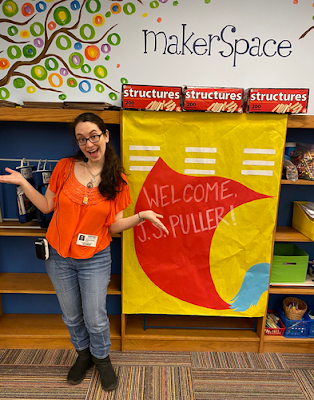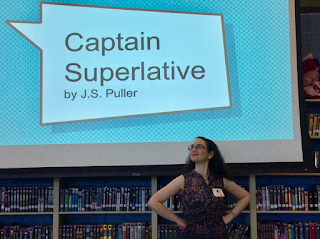By J.S. Puller
I'm going to start with the advice portion of our program right off the bat. If you plan to be a children's book author and visit schools and libraries, the most important thing you can do to ensure success isn't finding a killer publicist or designing the world's greatest PowerPoint presentation. No, here's what you need to do: Sign up for an improv class.
Yes, I'm serious and, no, that's not an improv-style joke. Truthfully, jokes aren't even the point of improv. You aren't going to come out of the class a stand-up comedian, but you will come out of it better able to think on your feet. And thinking on your feet is a critical skill when it comes to presenting to students. It's true what they tell us, "Kids say the darndest things." And here's just a small sampling of the questions that I've had to tackle--on the fly--in the early days of my writing career.
Consider this post a cautionary tale. Once you publish a book, then the real hard work begins.
10. HOW OLD ARE YOU?
This question is surprisingly inevitable. Children don't have a good concept of age. It probably doesn't help that I still get carded trying to get into R-rated movies. I used to answer the question honestly, telling the students my age. Ultimately, though, it meant nothing to them and opened the door up to allowing them to ask other questions about me and my life, instead of my work. Nowadays, my standard answer to the question is "I'm one thousand, seven hundred, and one years old." It gets a laugh and discourages follow-up questions about me, hopefully focusing back on the writing.
9. ARE THEY GOING TO MAKE A MOVIE OF THE BOOK?
It's always tempting to reply "I wish." Because I do wish it, but don't think it's likely. Rather than say that though, I usually explain that it's an extremely complicated process, taking a book to a movie. There are a lot of players involved and relationships needed. I like to end by joking, "But if any of you know someone who works in Hollywood, please tell them you'd like to see a movie of my book." It gets a laugh and avoids delving into the intricate details of adaptation.
8. WHY DO YOU HAVE “SHE/HER” IN YOUR NAME?
This is a relatively new phenomenon, with the advent of the Zoom school visit. I could almost see the librarian's eyes fill with horror, absolutely sure that I was going to launch into a Ted talk about the nuances of gender. I didn't. While I have thoughts on the subject, that's not what I was there to discuss and it wasn't the subject of my book. I decided to be simple and straightforward. "Because you can't always tell what someone is. Sometimes the name isn't obvious. Or their image on Zoom is too small. It's easier just to tell people what you want to be called."
7. HOW MANY FINGERS DO YOU HAVE?
Yes, a sixth-grader actually asked me that one. A lot of kids chime in just because they want to talk into the mic. Questions like these are actually easy to pivot. "Well, I have ten. But you know, I think you're here to ask me questions about my book. And if you don't have any, then your teachers will probably decide it's time to go back to class. So let's try to stay on topic, so we can be together as long as possible."
6. WHAT ARE YOUR OPINIONS ON SOCIALISM?
Like the question above, for this student, it was more about having the spotlight than asking about my work (which is not about socialism). Not wanting to get off topic or start sharing my personal politics, I pivoted to the book. "Well, a lot of people believe that socialism is rooted in people trying to help others. And [Main Character of My Book] believed in helping others. So I suspect she would have a lot to say on the subject."
5. WHY DON’T [TWO CHARACTERS FROM THE BOOK] END UP DATING?
I always want to shout, "Because literature is not Noah's Ark and we don't need to march off two-by-two." That wouldn't play well. Instead, my answer is usually along the lines of "Because this story isn't about romantic love. It's about other kinds of love." Interestingly, it's usually the adults in the room, rather than the students, who ask me this one.
4. DID YOU DRAW YOUR COVER?
It's tempting to simply say "no." It's the truth and that's that. But when I get this question--and I get it a lot--I like to use it to give kids a better glimpse into the world of children's lit. Something I've learned entirely through diffusion and conversation, is that many authors and illustrators never meet. I love to tell them the story of seeing an author and illustrator meet for the first time at an award ceremony. It often fascinates them and drives them to work on their own covers for my novel, which can be a great lesson for teachers.
3. WHAT HAPPENS TO [CHARACTER FROM MY BOOK] AFTER THE STORY ENDS?
"I don't know! Why don't you write it and tell me?" My presentations always have a heavy emphasis on story creation and encouraging kids to write and use their imaginations. Unlike some authors, I encourage fanfiction. I think it's a wonderful entry into writing, because it allows kids to skip worldbuilding and character creation, instead focusing on plot and dialogue. I'm always quick to add that I used to write fanfiction and some of my work is still out there on the internet...somewhere. Under another name. One I will never share. Ever.
2. DO YOU LIKE MARVEL OR DC?
This seemingly simple question is a trap. The wrong answer can turn some kids against you. Since my debut novel, CAPTAIN SUPERLATIVE, is about superheroes, I've developed the perfect answer: "Marvel for movies, DC for TV." Everyone's favorite is best at something. And it proves I'm savvy enough to know the different products out there, earning respect. Often, before I start my presentation, I'll walk through the audience and comment on Spider-man tee shirts or Batman sneakers, just to hint to them that I know my stuff. While I hate the idea of an "us-vs-them" mentality, it never hurts to get the kids on your side. Or prove you're on theirs.
1. IS THIS THE REAL LIFE? IS THIS JUST FANTASY?
Sometimes, you just sing along.
FINAL THOUGHT
My beta reader for this particular essay scolded me for sounding too hard on children. This was certainly not my intention in the least. Talking to student groups is one of my favorite things to do as an author. I can't get enough of it! And I love some of the surprising and fascinating things that come out of their mouths.
And lest you think it's only children who ask me some bizarre questions, I want to close out with one of the more hilariously odd questions that an adult once asked. Shortly after I sent an ARC copy of CAPTAIN SUPERLATIVE to my grandmother, she called me up. She told me she'd finished the novel and wanted to know something. "Who wrote all of the poems in the story?"
...I did, Grandma. I'm the author. I did.
ABOUT THE AUTHOR
J. S. Puller is a playwright and author from the Windy City, Chicago. She has a master’s degree in elementary education and a bachelor’s degree in theatre from Northwestern University. She is an award-winning member of the American Alliance for Theatre and Education. When not writing, she can usually be found in the theatre. She is the author of two novels, CAPTAIN SUPERLATIVE and THE LOST THINGS CLUB. She also has several published plays, including: WOMEN WHO WEAVE (Playscripts, Inc.), PERSEUS AND MEDUSA - IT'S ALL GREEK TO ME! (Lazybee Scripts), and THE DEATH OF ROBIN HOOD (Stage Rights).
Website: pullerwrites.wordpress.com
Twitter: twitter.com/pullerwrites
Facebook: facebook.com/puller.writes




No comments:
Post a Comment